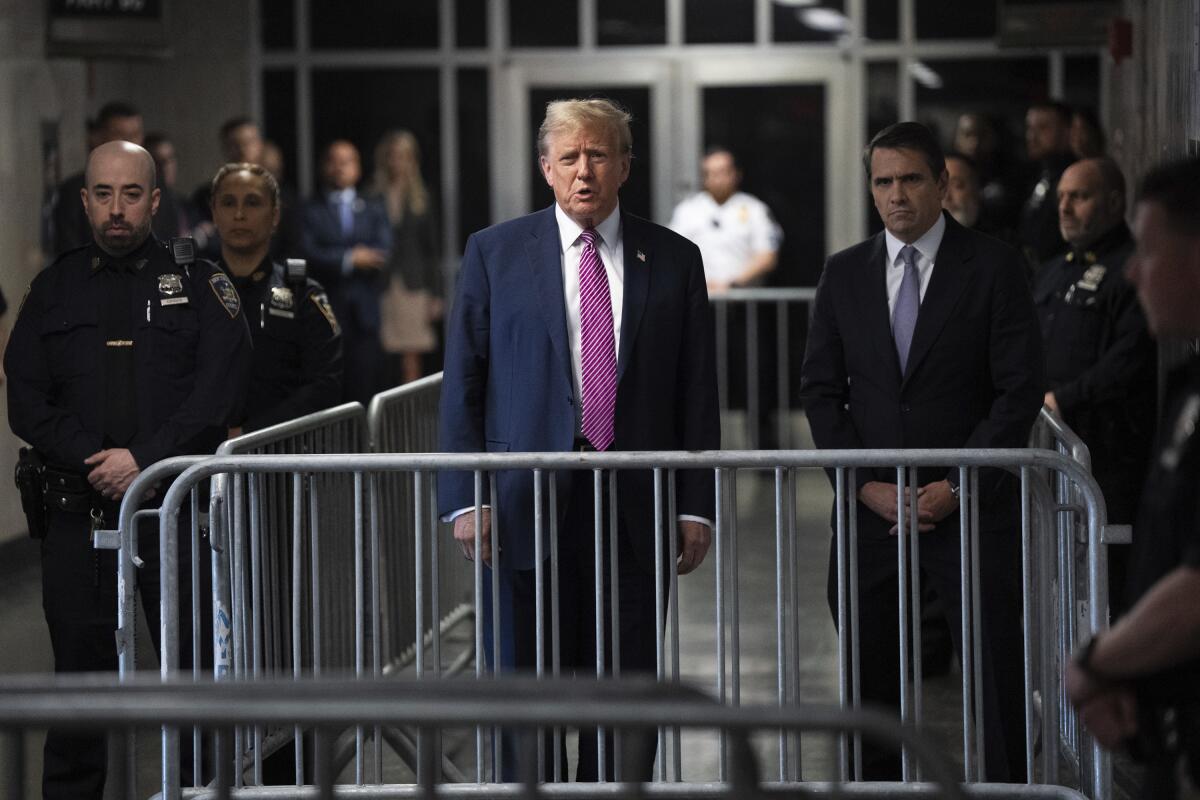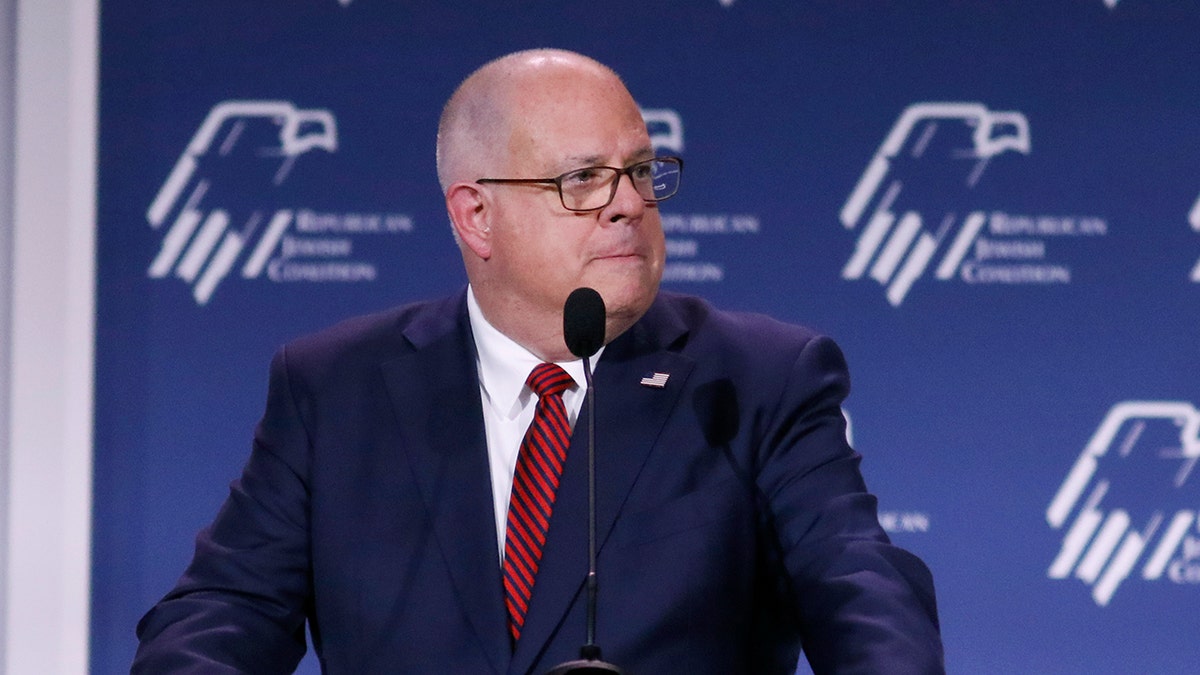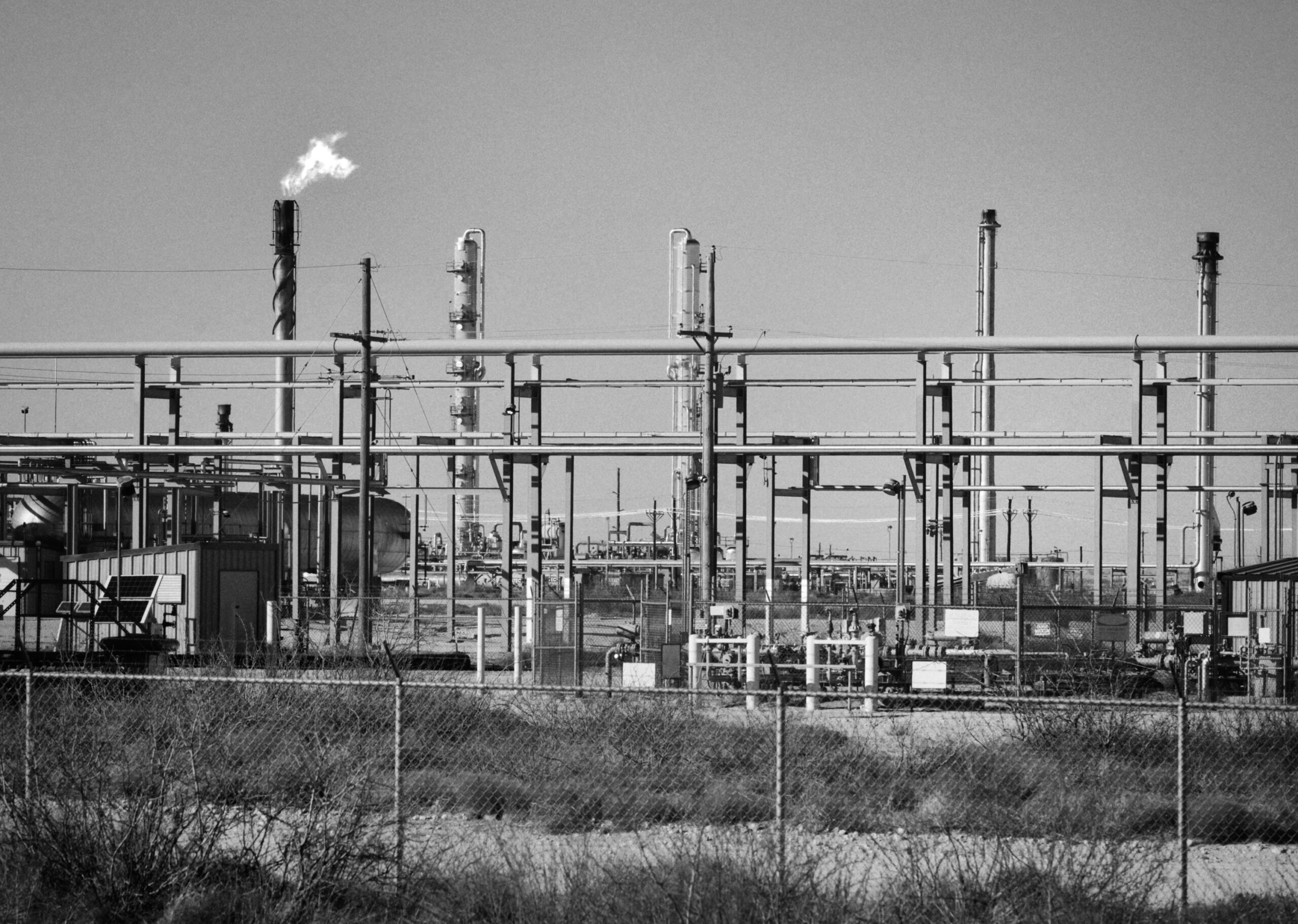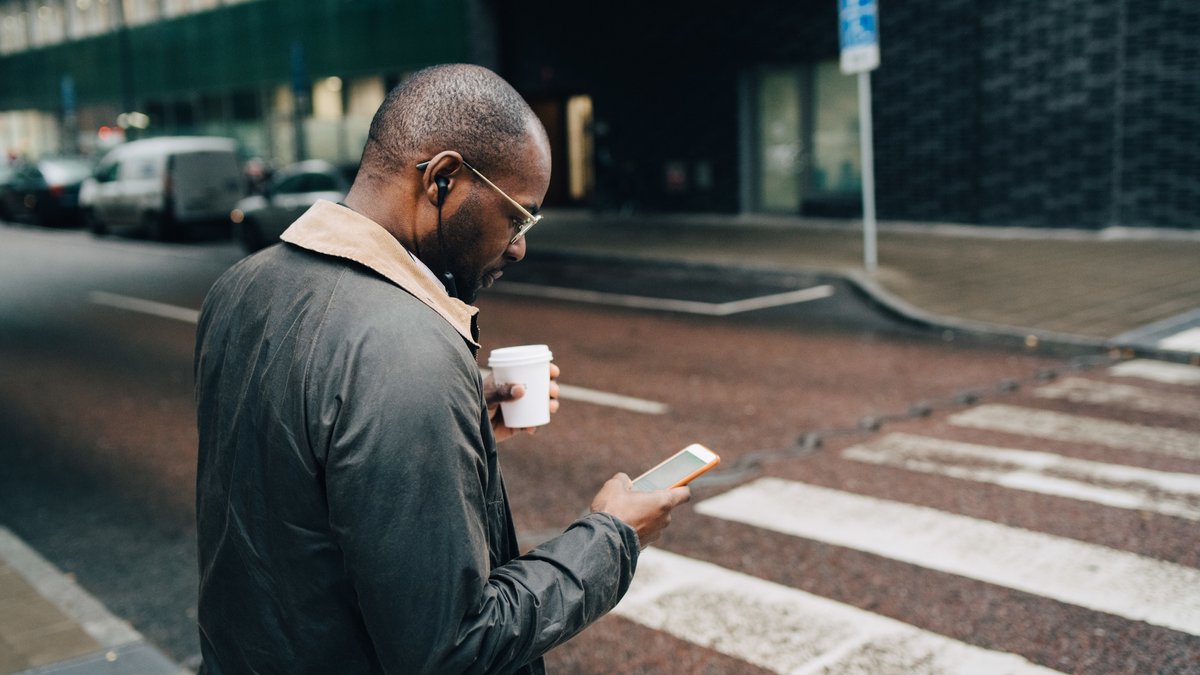Politics
Column: Trump's hush-money criminal trial could be a cure for 'Trump amnesia'

Before Donald Trump’s hush-money trial in New York got underway, pundits predicted that the proceedings could be a media bonanza for the former president. During this year’s Republican primaries, they noted, Trump’s popularity rose every time he was indicted.
But so far, the trial, on charges that Trump covered up illicit payments to an adult filmmaker and actor to influence the 2016 election, hasn’t made him look like much of a hero.
Former President Trump sits in court during the second day of jury selection in his criminal hush-money trial in Manhattan criminal court.
(Christine Cornell / Associated Press)
He’s appeared to fall asleep in the courtroom more than once. He’s grumbled at potential jurors. He’s been reprimanded by the judge. He looks more like an desperately unhappy defendant than a potential commander in chief.
And it’s likely to get worse. Over the next six weeks, the trial may include testimony from Stormy Daniels, the porn performer with whom Trump allegedly had a one-night stand, and Karen McDougal, a former Playboy model who accepted money to conceal another alleged affair.
The tawdry details will produce plenty of tabloid drama — but not the kind Trump reveled in when he was a young, publicity-hungry mogul. (Trump has denied having affairs with the women.)
More important, the trial might begin to cure voters of the affliction known as “Trump amnesia” — the tendency to forget all the reasons they voted against the presumptive Republican nominee in 2020.
Pollsters and campaign consultants who conduct focus groups, organized discussions with voters, say they run into it all the time.
Celinda Lake, one of President Biden’s pollsters, said she discovered the syndrome when she asked voters how they felt about Trump’s impending trial over the events surrounding the violent Jan. 6, 2021, invasion of the Capitol.
“What court case?” one of the voters asked.
“These were swing voters, and about half of them weren’t sure what we were talking about,” Lake recalled. “And I said, ‘Well, you know, the insurrection, and that he was the one who provoked it.’ They go: ‘Oh, yeah, I kind of forgot about that.’ ”
The reasons for the epidemic of memory loss aren’t mysterious. Trump left office more than three years ago — and for the last two years, voters have been focused on rising prices and mortgage rates, problems they blame on Biden.
When Trump left office in 2021 after his followers sacked the Capitol, the Gallup Poll logged his approval rating at a dismal 34%. By last year, with memories no longer so fresh, voters’ views had softened: 46% said they thought his presidency had been pretty good — a phenomenon some have called “Trump nostalgia.”

Donald Trump speaks with the media Friday following jury selection in his hush-money criminal trial in Manhattan.
(Maansi Srivastava / Associated Press)
Trump has stoked that trend over the last three years by claiming ceaselessly that he produced “the greatest economy in the history of the world” (it wasn’t) with “no inflation” (also untrue).
Democrats and anti-Trump Republicans hope the trials could dent the former president’s support by changing the focus of news coverage, at least for a time, to his many misdeeds.
Trump is facing four different criminal prosecutions: separate federal and Georgia indictments accusing him of trying to undo the 2020 election, a federal indictment accusing him of illegally holding classified documents, and the New York hush-money case. It’s not certain that any of the other three will reach trial by the election.
If he is convicted in any of the four proceedings, polls suggest that a significant number of voters might well desert him.
A Reuters/Ipsos poll this month reported that 13% of voters who currently favor Trump say they won’t vote for him if he is convicted of a felony.
If even a fraction of those voters carry out their threat, the former president’s apparent lead over Biden could evaporate. In 2020, a vote shift of less than a percentage point in three close-run states would have changed the outcome in the electoral college.
It’s reasonable to ask whether a conviction in the New York case, which legal scholars consider the weakest of the indictments Trump faces, would affect voters’ behavior.
But polls have found that most voters believe the hush-money charges qualify as weighty crimes despite their tawdry origins. In the Reuters/Ipsos poll, 64% of respondents said they consider the New York charges serious, including 40% of Republicans.
Not everyone is convinced.
“I think the Biden campaign is whistling past the graveyard on this,” said Whit Ayres, a veteran Republican pollster who is not working for Trump. “The issue is not whether voters remember Trump’s antics. The issue is that they are accurately remembering the economic differences between the two presidencies.”
All of which is true.
Chances are, the hush-money trial in New York isn’t going to swing the election by itself.
But if Trump is convicted of a felony — especially if he is also convicted in more than one of the four trials he faces — that could change enough votes to make a difference in an election that’s likely to be razor-close.
At the very least, the New York trial isn’t doing Trump any measurable good, despite his daily denunciations of the judge, the prosecutor and the gag order that doesn’t seem to be gagging him.
No wonder he looks so annoyed.

Politics
Dem newcomer aims for history with primary win over wealthy controversial congressman

A Maryland Democrat new to the national political stage has won her state’s Senate primary against a wealthy controversial congressman who spent millions of his own money on the race.
Prince George’s County Executive Angela Alsobrooks, who could be the first Black woman from Maryland ever elected to the U.S. Senate, topped Rep. David Trone in a race called by The Associated Press.
She will now face former Republican Gov. Larry Hogan in what could end up being a race that’s more competitive than expected considering Maryland’s heavy Democratic leanings and Hogan’s popularity in the state.
RACIAL SLUR, ALLEGED THREAT TO ‘EXECUTE’ MAN: WATCH MOST OUTRAGEOUS MOMENTS FROM THIS DEM SENATE CANDIDATE
Democratic Maryland Senate candidates Angela Alsobrooks and Rep. David Trone. (Getty Images)
Trone spent about $60 million of his own money to defeat Alsobrooks, but a number of controversies and the latter’s popularity among state party figures appeared too much for him to overcome.
Alsobrooks was first elected as state’s attorney of Prince Georges County in 2010, where she served until being elected as country executive in 2018. She had never before run for federal office.
Democrats are hoping Black voters will rally around Alsobrooks’ potentially historic candidacy and that it will overcome Hogan’s popularity.

Larry Hogan, governor of Maryland, speaks during the Republican Jewish Coalition Annual Leadership Meeting in Las Vegas, Nov. 18, 2022. (Ronda Churchill/Bloomberg via Getty Images)
Democrats have a one-seat majority in the Senate, a narrow majority threatened by the number of seats being contested in states where Republicans are expected to perform well.
Election analysts rate the Maryland Senate race as “likely” Democrat.
Get the latest updates from the 2024 campaign trail, exclusive interviews and more at our Fox News Digital election hub.
Politics
$3.3 billion available for mental health beds as Newsom jump-starts Prop. 1 spending

Gov. Gavin Newsom announced Tuesday that the state will make $3.3 billion in funding available by July to begin building inpatient and outpatient mental health treatment centers as part of a massive effort to transform California’s mental health system and address the homelessness crisis.
The money is the first tranche of a $6.4-billion bond authorized by voters when they narrowly approved Proposition 1 in March.
Newsom traveled to a new facility in San Mateo County to make the announcement — to underscore, his office said, how many more such facilities are needed and how his hard-fought mental health measure can transform care for Californians.
Newsom has framed Proposition 1 as an essential part of the state’s strategy to address the homelessness crisis. The plan includes a controversial push to compel people with severe mental illness and substance disorders into care. With the bond funding, it also makes billions of dollars available to build more beds and housing for treatment.
“In a matter of weeks, $3.3 billion will go out and we’ll quickly approve those plans,” Newsom told reporters outside a Redwood City treatment facility that plans to add more housing once money funnels in this summer. “In a matter of months, not a matter of years.”
Newsom also urged counties to sign up early for CARE Court, another program he has championed to help resolve the state’s mental health and homelessness crisis. Counties have until the end of the year to open specialized courts that offer voluntary treatment and services. San Mateo County, south of San Francisco, recently became the ninth county to sign up.
“Counties don’t have to wait until December. Let’s go. Get those applications going,” he said.
When the proposition passed, Newsom said “this historic reform will only succeed if we all kick into action immediately — state government and local leaders, together.”
This week, his staff said the governor was doing his part: This first round of funding wasn’t promised until the fall.
For the record:
9:11 a.m. May 14, 2024An earlier version of this article said Proposition 1 expands the criteria for the detention, treatment and conservatorship of people with severe mental illness. That policy is in a separate bill Newsom signed last year.
In addition to spearheading the construction or rehabilitation of more than 10,000 treatment beds and over 45,000 outpatient treatment slots, Proposition 1 reforms California’s 20-year-old Mental Health Services Act to improve care and support for people with serious mental health issues. A separate bill signed last year, Senate Bill 43, expands the criteria for the detention, treatment and conservatorship of people with severe mental illness — an effort that was strenuously opposed by some civil liberties advocates.
The pot of money available for project applications in July is specifically earmarked to build or refurbish treatment centers and clinics. Counties, cities, tribes, nonprofits and for-profit companies will all be eligible to apply for funding.
To qualify, construction projects must have support from their county mental health department, and they must commit to treating patients with Medi-Cal as well as private insurance.
All projects are required to put up matching funds or collateral. That could include land or a building, as well as a funding stream, such as a pledge from a healthcare provider to send patients there or from the opioid settlement, in which pharmaceutical companies and distributors are paying the state millions to help address the harms of the epidemic of addiction.
Once grant applications arrive, officials said they could be approved within three months, meaning money could be distributed around the end of the year.
Later in the year, officials said they planned to open a new round of grants to build and rehabilitate more than 13,000 permanent supportive housing units.
Then, next year, officials will open another $1 billion to support additional buildings or programs, they said.
Politics
Video: Blinken Plays “Rockin’ in the Free World” for Ukraine Soldiers

new video loaded: Blinken Plays “Rockin’ in the Free World” for Ukraine Soldiers
transcript
transcript
Blinken Plays “Rockin’ in the Free World” for Ukraine Soldiers
During a visit to Kyiv, Secretary of State Antony Blinken played Neil Young’s “Rockin’ in the Free World” with a local band at a bar in a show of support for Ukraine.
-
Listen, I know this is a really, really difficult time. Your soldiers, your citizens, particularly in the northeast in Kharkiv, are suffering tremendously. But they need to know, you need to know, the United States is with you, so much of the world is with you. And they’re fighting not just for a free Ukraine, but for the free world. And the free world is with you, too. So maybe we can try something? I don’t know if we can pull this off — we’ll see. [music: “Rockin’ in the Free World”] [cheering]
Recent episodes in Ukraine Crisis
-

 Politics1 week ago
Politics1 week agoHouse Dems seeking re-election seemingly reverse course, call on Biden to 'bring order to the southern border'
-

 Politics1 week ago
Politics1 week agoFetterman says anti-Israel campus protests ‘working against peace' in Middle East, not putting hostages first
-

 World1 week ago
World1 week agoGerman socialist candidate attacked before EU elections
-

 News1 week ago
News1 week agoUS man diagnosed with brain damage after allegedly being pushed into lake
-

 World1 week ago
World1 week agoGaza ceasefire talks at crucial stage as Hamas delegation leaves Cairo
-

 Politics1 week ago
Politics1 week agoRepublicans believe college campus chaos works in their favor
-

 World1 week ago
World1 week agoStand-in Jose Raul Mulino wins Panama presidential race
-

 World1 week ago
World1 week agoTech compliance reports, Newsletter














